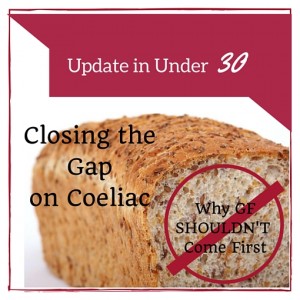A patient walks into your client and reports that they think they might be reacting to gluten. Happens every week, if not every day, right? Awareness about potential negative health effects from gluten is exploding and often patients present self-diagnosing and self prescribing a gluten free(ish!) regime. What’s your role? To simply back them up with a, ‘Yeah gluten is bad’ response, congratulate them on removing it and encourage them to keep going or to support them in pursuing a proper line of investigation which involves both critical thinking and appropriate testing? You guessed it…the latter!
I know my opinion about keeping gluten in the diet until you understand the ‘why’ is not popular right now but let’s think about it using the following common scenario: 27yo Jo has recently taken gluten out of her diet because she experiences bloating and some flatulence when she eats wheat.
If we don’t identify which of the 4 gluten reactions (coeliac dx, wheat allergy, FODMAPS, non-coeliac gluten sensitivity) are at play, we can not properly advise her – if we just tell her to minimise all gluten this might be ok for NCGS but would not be effective in FODMAPS and would remove lots of unnecessary foods in wheat allergy. Worse still, what if Jo actually has coeliac disease? Instead of just ‘minimising gluten’ Jo would need a radical re-education about food, sharing cooking appliances, not buying food from bulk bins, eating out etc. Without this her small intestinal villi is unlikely to heal. Let’s go a few years down the track when Jo has kids – because she was never investigated properly, she doesn’t know she actually carries the coeliac gene and therefore should be on the watch for this & act preventatively in her own children due to the high heritability. Knowing what we’re really dealing with and empowering patients with this knowledge too, is surely step 1 in good client management.
Non-coeliac gluten sensitivity (NCGS) is increasingly being recognised in mainstream medicine and is an issue that definitely effects more of our clients than coeliac disease. We now have important information about how to recognise and diagnose this condition, as highlighted by this nice review paper here but guess what the first step in diagnosing NCGS is…..? Rule out coeliac disease!! Anyway, just some (GF) food for thought 🙂
The latest Update in Under 30 recording speaks to the seriousness and primacy of identifying Coeliac Disease in any patient reporting a suspected reaction to gluten and takes you through the latest evidence on the best screening protocol. With an increased understanding about the strengths and limitations of gene testing, serology and biopsy, we have a clear map to follow now. Along the way Rachel outlines 3 additional potential mechanisms for ‘gluten’ reactions amongst our patients, what to look for and how to tell the difference. This audio comes with 3 great up to date review articles as well. You can now purchase this latest Update in Under 30 audio that comes with a bonus pdf downloadable journal articles by clicking here.
Did you know that all of Rachel’s educational material can count towards your CPE points? Invest your time and money into something with a guaranteed return – stay up to date with current research and learn how to apply this information in your clinic on a daily basis. Check out Rachel’s educational material here.

